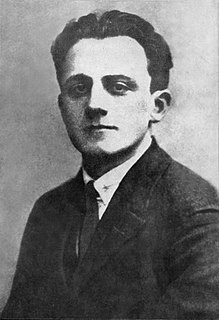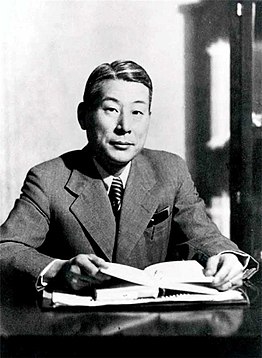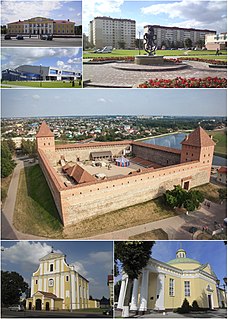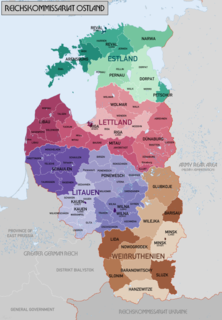Moses W. Beckelman (1906–1955) was a social worker from New York City. He began his career with the American Jewish Joint Distribution Committee (JDC or Joint) in 1939, becoming its director-general in 1951.
The American Jewish Joint Distribution Committee, also known as the Joint or the JDC, is a Jewish relief organization based in New York City.
Born in New York, Beckelman graduated from the College of the City of New York in 1928. He further took graduate classes at Columbia University, the School for Jewish Social Work and the New York School of Social Work. He joined JDC in 1939 and was sent to Vilna in October 1939, where he faced a refugee crisis in the aftermath of the Invasion of Poland. With his colleague Yitzhak Gitterman, Beckelman arranged to feed, house, and clothe thousands of people, as well as provide care for children and the elderly, sponsor cultural activities, and offer vocational training.

The City College of the City University of New York is a public senior college of the City University of New York (CUNY) in New York City.

Columbia University is a private Ivy League research university in Upper Manhattan, New York City. Established in 1754, Columbia is the oldest institution of higher education in New York and the fifth-oldest institution of higher learning in the United States. It is one of nine colonial colleges founded prior to the Declaration of Independence, seven of which belong to the Ivy League. It has been ranked by numerous major education publications as among the top ten universities in the world.

The Invasion of Poland, known in Poland as the September Campaign or the 1939 Defensive War, and in Germany as the Poland Campaign (Polenfeldzug), was an invasion of Poland by Germany that marked the beginning of World War II. The German invasion began on 1 September 1939, one week after the signing of the Molotov–Ribbentrop Pact between Germany and the Soviet Union. The Soviets invaded Poland on 17 September following the Molotov–Tōgō agreement that terminated the Soviet and Japanese Battles of Khalkhin Gol in the east on 16 September. The campaign ended on 6 October with Germany and the Soviet Union dividing and annexing the whole of Poland under the terms of the German–Soviet Frontier Treaty.
At the end of 1939, Beckelman and Gitterman set out for Stockholm on an Estonian passenger ship. Beckelman planned to send uncensored reports to the home office in New York and then return to Vilna; Gitterman hoped to flee Europe. The Germans seized the ship, and both men were arrested. Gitterman was sent back to Poland, where he continued to work for the JDC and perished during a Warsaw ghetto action in January 1943.

Stockholm is the capital of Sweden and the most populous urban area in the Nordic countries; 962,154 people live in the municipality, approximately 1.5 million in the urban area, and 2.3 million in the metropolitan area. The city stretches across fourteen islands where Lake Mälaren flows into the Baltic Sea. Just outside the city and along the coast is the island chain of the Stockholm archipelago. The area has been settled since the Stone Age, in the 6th millennium BC, and was founded as a city in 1252 by Swedish statesman Birger Jarl. It is also the capital of Stockholm County.

The Warsaw Ghetto Uprising was the 1943 act of Jewish resistance in the Warsaw Ghetto in German-occupied Poland during World War II to oppose Nazi Germany's final effort to transport the remaining ghetto population to Majdanek and Treblinka concentration camps. After the Grossaktion Warsaw of summer 1942, in which more than a quarter of a million Jews were deported from the ghetto to Treblinka and murdered, the remaining Jews began to build bunkers and smuggle weapons and explosives into the ghetto. The left-wing Jewish Combat Organization (ŻOB) and right-wing Jewish Military Union (ŻZW) formed and began to train. A small resistance effort to another roundup in January 1943 was partially successful and spurred the Polish groups to support the Jews in earnest.
Beckelman was able to return to Lithuania and continued to support the refugees. He left Lithuania in February 1941 and was posted to South America in 1941–42. He then joined the U.S. Office of Strategic Services, State Department's Office of Foreign Relief and Rehabilitation Operations, and UNRRA. In February 1945, he became assistant to Herbert William Emerson, director of the Intergovernmental Committee on Refugees. He re-joined JDC in 1946 as second-in-command of the European programs and was elected as director-general of JDC in 1951.

Lithuania, officially the Republic of Lithuania, is a country in the Baltic region of Europe. Lithuania is considered to be one of the Baltic states. It is situated along the southeastern shore of the Baltic Sea, to the east of Sweden and Denmark. It is bordered by Latvia to the north, Belarus to the east and south, Poland to the south, and Kaliningrad Oblast to the southwest. Lithuania has an estimated population of 2.8 million people as of 2019, and its capital and largest city is Vilnius. Other major cities are Kaunas and Klaipėda. Lithuanians are Baltic people. The official language, Lithuanian, along with Latvian, is one of only two living languages in the Baltic branch of the Indo-European language family.

South America is a continent in the Western Hemisphere, mostly in the Southern Hemisphere, with a relatively small portion in the Northern Hemisphere. It may also be considered a subcontinent of the Americas, which is how it is viewed in the Spanish and Portuguese-speaking regions of the Americas. The reference to South America instead of other regions has increased in the last decades due to changing geopolitical dynamics.

The Office of Strategic Services (OSS) was a wartime intelligence agency of the United States during World War II, and a predecessor to the Central Intelligence Agency (CIA). The OSS was formed as an agency of the Joint Chiefs of Staff (JCS) to coordinate espionage activities behind enemy lines for all branches of the United States Armed Forces. Other OSS functions included the use of propaganda, subversion, and post-war planning. On December 14, 2016, the organization was collectively honored with a Congressional Gold Medal.














